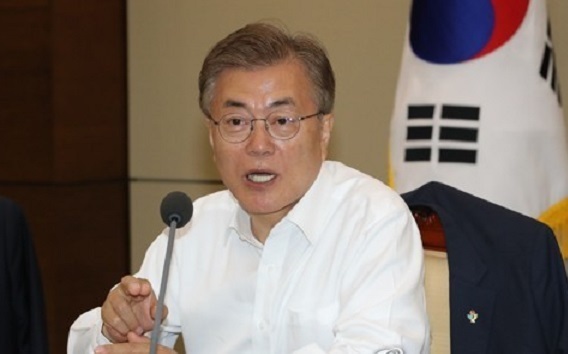South Korea on Monday started a full-fledged step to realize its slogan of the "income-led growth" through an 11.2 trillion-won ($9.99 billion) supplementary budget.
The budget proposal -- which came less than one month after President Moon Jae-in took office -- is aimed at helping the needy get jobs and higher income. Moon has vowed to put his policy priority on creating jobs, especially for young people.
Moon's "income-led growth" principle is similar to the concept of inclusive growth, meaning economic growth that creates opportunities for all segments of the population and distributes the dividends of increased prosperity, both in monetary and non-monetary terms, fairly across society, according to the Organization for Economic Cooperation and Development.

President Moon Jae-in speaks during a meeting with his senior aides at the presidential office Cheong Wa Dae in Seoul on June 1, 2017. (Yonhap)
The president has said that the government will come up with various job-creating policies throughout his five-year term to increase the income of young people, temporary workers, and small and mid-sized enterprise (SME) employees.
His pledges include a plan to create 810,000 public jobs and remove temporary workers from the government agencies and state-run institutions.
The latest extra budget proposal, just a fraction of the 400 trillion-won state budget for 2017, is a fiscal tool to create 110,000 new jobs by the end of 2017 and help SMEs hire more young people.
It showed that 4.2 trillion won will be poured into creating jobs, and 1.2 trillion won and 2.3 trillion won will be used to improve working conditions and stabilize the livelihoods of ordinary people, respectively. The remaining 3.5 trillion won will be given to provincial governments.
Moon has said the public sector will take the initiative in creating jobs as the private sector has failed to generate jobs and lead economic development for the recent few years.
Asia's fourth-largest economy has been experiencing a high jobless rate for the past few years. Its unemployment rate was 3.7 percent in 2016, marking the highest since 2010, with the numbers for those aged between 15 and 29 hitting an all-time high of 9.8 percent.
The latest figures remained worse, as the jobless rate hit a seven-year high of 5 percent in February and reached 4.2 percent in April, the highest rate among all April data.
Job conditions for the youth were alarmingly worrisome, and their unemployment rate soared to an all-time high of 12.3 percent in February and stayed above the 11 percent line until April.
"If we don't take extraordinary measures to tackle the high youth jobless rate, it will never get better," Deputy Finance Minister Park Chun-sup said in a press briefing Friday.
Experts expected the extra government spending to contribute to improving the job market in the first place and fueling the recent recovery pace of the South Korean economy.
South Korea's gross domestic product expanded 1.1 percent in the January-March period from the previous quarter, marking a slight increase from an earlier estimate of a 0.9 percent expansion in late April. Brisk exports lent support to the upturn in the economy, with outbound shipments gaining ground for seven straight months since November last year.
The finance ministry expected the supplementary budget to push up the country's growth by 0.2 percentage point for 2017.
They said the fiscal intervention will prop up the economy in advance as it will take some time for businesses to make actual investments and carry out recruitment.
"I think the latest supplementary budget will result in less financial burden as the government is issuing no state bonds," said Shin Min-young from the LG Economic Research Institute. "The fiscal role will expand in the midst of contracted domestic consumption."
Some said the government needs more cautious measures to create more quality jobs and provide a friendly environment for businesses to expand employment. (Yonhap)






